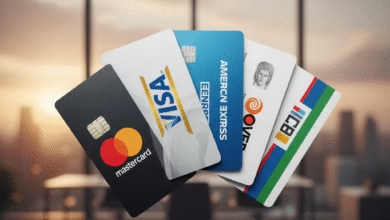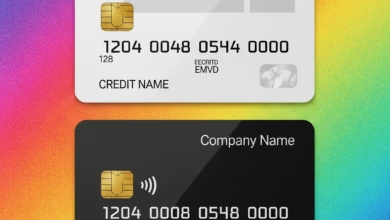
Choosing the right credit card can feel like navigating a maze of interest rates, fees, and rewards programs. But don’t worry! This guide will break down the key considerations in plain English, helping you find a card that fits your financial needs and habits.
Understanding Your Credit Score: The Foundation of Credit Card Approval

Before you even start browsing credit card offers, understanding your credit score is crucial. Your credit score is a three-digit number that reflects your creditworthiness. A higher score generally means you’ll qualify for better cards with lower interest rates and more attractive rewards.
- Check Your Credit Report (How to Check Your Credit Report for Free in the USA): Obtain free copies of your credit reports from the three major credit bureaus (Equifax, Experian, TransUnion) at AnnualCreditReport.com. Review them for any errors and understand your current standing.
- Know Your Score Range (Understanding Credit Score Ranges for Different Credit Cards): Familiarize yourself with the different credit score ranges (e.g., poor, fair, good, excellent) to gauge the types of cards you’re likely to be approved for.
Identifying Your Spending Habits: Tailoring Your Card to Your Lifestyle
The best credit card for you will align with how you typically spend money. Consider these questions:
- What are your primary spending categories? (Best Credit Cards for Groceries, Gas, Travel, Dining): Do you spend a lot on groceries, gas, travel, or dining? Look for cards that offer bonus rewards in these categories.
- Do you carry a balance? (Low APR Credit Cards for Balance Transfers and Debt Consolidation): If you tend to carry a balance, prioritize cards with low Annual Percentage Rates (APRs) to minimize interest charges.
- Are you a frequent traveler? (Best Travel Credit Cards with Rewards and Benefits): If you travel often, explore cards with travel rewards like airline miles, hotel points, and travel insurance.
Comparing Rewards Programs: Maximizing Your Benefits

Credit card rewards can be a significant perk, but it’s essential to understand how they work:
- Cash Back Rewards (Best Cash Back Credit Cards for Everyday Spending): These cards offer a percentage of your spending back as cash, typically credited to your statement.
- Points Rewards (Understanding Credit Card Points and Their Value): Points can usually be redeemed for travel, merchandise, or gift cards. The value of points can vary.
- Miles Rewards (Best Airline and Hotel Credit Cards with Miles and Points): Specifically designed for travel, these cards earn miles that can be redeemed for flights and hotel stays.
Understanding Interest Rates (APR): The Cost of Carrying a Balance
The APR is the annual cost of borrowing money if you carry a balance on your credit card.
- Fixed vs. Variable APR (Understanding the Difference Between Fixed and Variable Credit Card APRs): Fixed APRs remain the same, while variable APRs can fluctuate based on market interest rates.
- Introductory APR Offers (Understanding 0% APR Credit Card Offers and Their Terms): Many cards offer a 0% introductory APR for a limited time. Be aware of the regular APR that will apply after the introductory period ends.
Scrutinizing Fees: Avoiding Unexpected Costs

Credit cards can come with various fees. It’s crucial to understand these potential costs:
- Annual Fees (Are Credit Cards with Annual Fees Worth It?): Some premium cards charge an annual fee for their enhanced rewards and benefits. Weigh the benefits against the cost.
- Late Payment Fees (Understanding Late Payment Penalties on Credit Cards): Paying your bill late can result in fees and potentially hurt your credit score.
- Balance Transfer Fees (Understanding Balance Transfer Fees and How They Work): If you transfer a balance from another card, you might incur a fee.
- Foreign Transaction Fees (Best Credit Cards with No Foreign Transaction Fees for International Travel): If you use your card internationally, be aware of foreign transaction fees.
Evaluating Additional Perks and Benefits
Beyond rewards, many credit cards offer additional benefits:
- Travel Insurance (Credit Cards with Travel Insurance Benefits): Some cards offer coverage for trip cancellations, lost luggage, and emergency medical expenses.
- Purchase Protection (Credit Cards with Purchase Protection and Extended Warranty): This can protect you against damage or theft of items purchased with your card.
- Concierge Services (Understanding Credit Card Concierge Services and Their Benefits): Certain premium cards offer concierge services for booking travel, restaurants, and events.
Considering Your Credit Limit: Responsible Spending

Your credit limit is the maximum amount you can charge on your card.
- Requesting a Suitable Limit (How to Request a Credit Limit Increase Responsibly): Choose a limit that aligns with your spending habits and ability to repay.
- Understanding Credit Utilization (Why Your Credit Utilization Ratio Matters): Aim to keep your credit utilization (the amount of credit you’re using compared to your total available credit) low, as it impacts your credit score.
Reading the Fine Print: Understanding the Cardholder Agreement
Before you apply for a credit card, carefully review the cardholder agreement.
- Understanding Terms and Conditions (Key Terms and Conditions in Credit Card Agreements): Pay attention to details about interest rates, fees, rewards programs, and any other important terms.
- Identifying Potential Changes (Understanding How Credit Card Terms and Fees Can Change): Be aware that credit card companies can sometimes change their terms and fees with notice.
Comparing Multiple Offers: Finding the Best Fit

Don’t settle for the first credit card you see. Compare multiple offers before making a decision.
- Using Comparison Websites (Best Credit Card Comparison Websites and Tools): Utilize online tools to compare different credit cards side-by-side.
- Considering Long-Term Value (Choosing a Credit Card for Long-Term Financial Benefits): Think about how the card will benefit you over time, not just the initial sign-up bonus.
By carefully considering these ten tips, you can confidently choose a credit card that aligns with your financial goals and spending habits, ultimately helping you manage your finances more effectively. Good luck!





